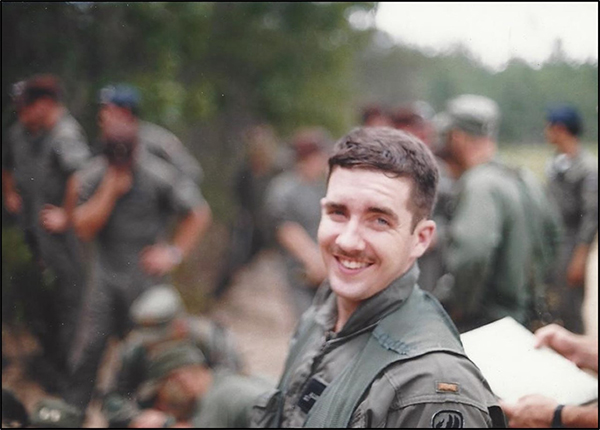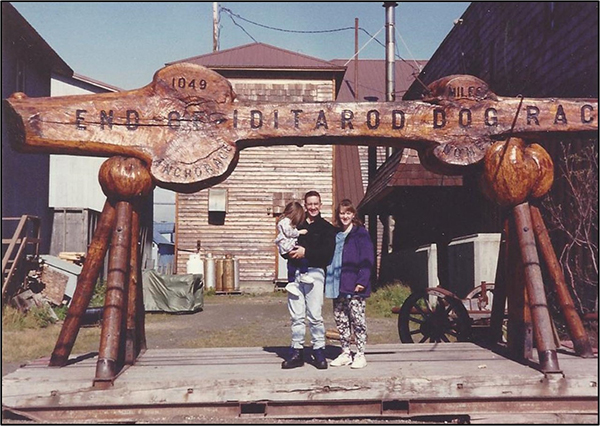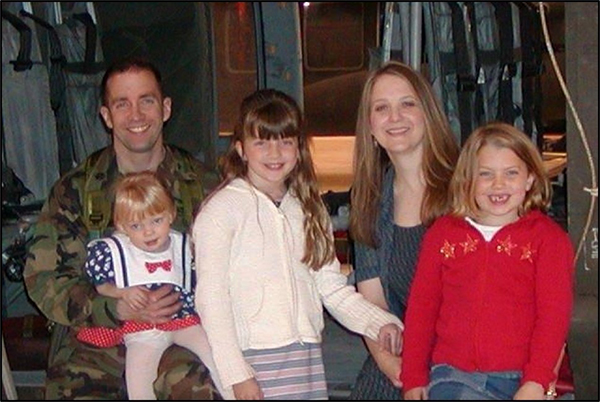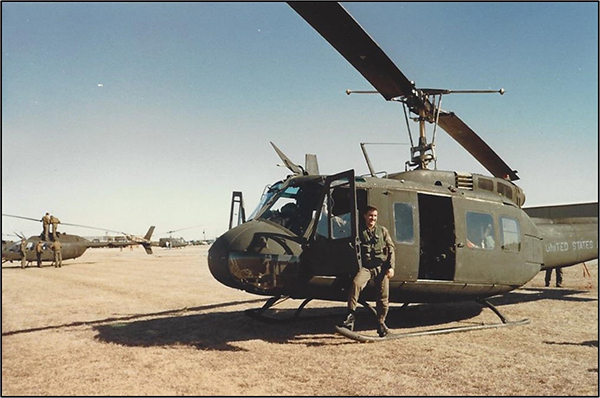The CEO of the Northwestern Foundation & Alumni Association is no fly-by-night guy.
By CAITLIN HOFEN, Features Editor

The hot, Alabama sun beat down on the airstrip’s asphalt. The young pilot was one of dozens of young men flying a Hughes TH-55 Osage helicopter for the first time.
He took a deep breath and walked through his pre-flight inspection step-by-step. He loaded his equipment and then climbed into the cockpit of the helicopter. After contacting the radio control tower, he was cleared for take-off.
He rose into the air and hovered over the airstrip, gazing across vast fields. Around him flew other youthful pilots. This was his first real taste of life in the air.
This was the fall of 1985, and the young pilot was Allen “Skeeter” Bird, now CEO of the Northwestern Foundation & Alumni Association.
“There were so many 22-year-olds on those small airstrips that day,” Bird said. “None of us had very many flight hours. I’m surprised no one died with so many of us in the air at one time.”
Bird served in the United States military for 20 years as a helicopter pilot in places such as Korea, Guatemala, Honduras and Haiti.
“In ninth grade, I read a book about four Air Force helicopter pilots,” Bird said. “After reading that book, I decided I wanted to be a helicopter pilot, and going into the service was the best way to do that.
“The Army had the most helicopters, so I figured that my best shot at reaching my dream was to go where there were more of them.”
Having found his dream career as a young man, Bird, then 17, attended basic training in Fort Jackson, South Carolina.
“It was the first time I had ever been away from home for more than a week,” Bird said. “Eight weeks with a bunch of other boys who also had never been away from home, either. It was a growing-up period that shaped me into who I became. It created discipline, structure and commitment. My values and integrity were shaped and nurtured by the military.”
CHOOSING NORTHWESTERN
Upon graduation from Tonkawa High School, Bird was set to attend Oklahoma State University on a full-ride ROTC scholarship. At his father’s encouragement, Bird toured Northwestern’s campus two weeks before school was set to start. He immediately felt at home.
“I drove over unannounced and walked into the [then-active] ROTC program,” Bird said. “The people were so incredibly nice all across campus. They took me around, and everybody I met was phenomenally wonderful.
“I went and pulled my scholarship from OSU. The guy who had interviewed me through that process was really ugly to me and said I was making a bad choice. That confirmed my decision. I came to Northwestern, and it worked out fabulously.”
Bird graduated in 1985 from Northwestern with a bachelor’s degree in history after changing his major four times.
Bird has lived all over the world during his time in the military. He said his favorite place was Alaska, where he and his family resided for 10 years.
“The summers in Alaska are beautiful,” Bird said. “We would camp 10-12 weekends every summer, and we didn’t even have air conditioning in the house. The darkness in the winter did wear on me, though.”
While on active military duty in Alaska, Bird continued his education, graduating from the University of Alaska with a master’s degree in public administration.
“When I got my master’s, I was looking into city management,” Bird said. “It was a great master’s program up in Anchorage. Almost every class period I would go, they’d give us a theory or a principle, and I’d go and apply it to my career. It really aligned with what I was doing and what I thought I was going to do.”
OUTDOOR PASTIMES
One of Bird’s favorite hobbies is hunting, something he could regularly do in Alaska.
“I love sheep hunting,” Bird said. “I had a friend, Steve Williams, who did several hunts with me. Some were superb, and some were horrible, but we still enjoyed our time together.
“One of those trips was Bernard Glacier. We flew out on top of a glacier. It was 21 miles up the glacier. Then, because of the airstrip we landed on, we had to hike out. It was an incredibly miserable hunt. We managed to get off the glacier alive through the rain, which became our ultimate goal. Shooting a sheep wasn’t even important anymore. We bonded over that trip.
“I remember one day, Steve got really disgusted, and I had to pick him up emotionally. Then the next day, he had to do the same for me. We finally made it out, but it definitely tested us.”
Williams has similar sentiments.
“We once went Dall Sheep hunting, and the ones we shot were miles away,” Williams said. “We had to hike so far up to get them. We had to sleep on the side of a mountain without a tent or anything, freezing all night. It was raining and snowing so much that it took us almost two days to get back down the mountain.
“Once we finally got down and crossed a river, I think we slept for two days before we even started skinning the sheep and cutting the meat out. We both had a lot of faith in each other, and we knew each other’s skills. That was the only way we made it down with those sheep.”
Another passion Bird has outside of his professional career is caring for horses.
“Over the last decade, I’ve been pretty heavy into horses,” Bird said. “One day, my youngest [daughter] was talking to her mom, and I overheard her ask, ‘Mom, if someone dies and goes to heaven, will they get what they didn’t get on Earth?’ And my wife answered, ‘Well yeah, what do you mean?’ and Libby goes, ‘Well, I just wondered if I’ll get a horse in heaven if I don’t get one on Earth.’ And that just crushed me. I could not go through life knowing that she didn’t have what she wanted. So, that is kind of how I got back into horses.”
SERVICE ABOVE SELF
Bird’s final military deployment was to Port-au-Prince, the capital of Haiti.
“I had the opportunity to supervise a small detachment in Haiti,” Bird said. “We had probably 35 people that were stationed in Port-au-Prince. At the time, Haiti’s government had been overturned, and we were trying to provide humanitarian relief.
“I had a variety of military branches under my command. Through the chaos of it all, we still made the best of it. We had movie nights frequently, and we played soccer on Sundays with the Argentinian hospital personal. I couldn’t have asked for a better final deployment because I love working with soldiers, and that was exactly what I got to do.”
After his time in the service, Bird and his family moved back to Alva, where he accepted a job as the Northwestern Foundation’s CEO. The Foundation & Alumni Association is a non-profit organization that funds scholarships for students.
“We listen to people, our donors and our alums, and listen for their passions,” Bird said. “At the same time, we’re listening to the university and their needs. Then, we just try to broker those two. We try to bring people with capacity and passions to people who also match those needs.
“When someone makes a gift here, we want them to be excited about it. We want them to be ready to do it again, because they’re so happy with the impact they made the first time.”
Under Bird’s leadership, the foundation has grown.
“When I started here, we had four employees, and now we have eight,” Bird said. “We’ve also grown in financial capacity because we were right round $10 million, and now, we’re around $33 million. So, the endowment has just about tripled, and what we deliver to students has tripled.”
Friends and colleagues praise Bird for his efforts as head of the foundation.
“Skeeter is very devoted to what he does and puts out a special effort to make things happen as CEO of the foundation,” said Don Campbell, an associate and friend of Bird. “I think he does a great job in what he’s doing.”
An advocate for higher education, Bird said he stands firm in his support of giving back to the institutions educating young people.
“We, as a nation, have divested ourselves of higher education and education in general,” Bird said. “We are not investing what we did probably 40 to 50 years ago, across the board. We don’t invest in our teachers like we used to, and we don’t invest in education like we used to.
“When I was in Haiti in 2004, their government was dissolved. There were no police or public utilities. But teachers were showing up in schools, and children were going to learn. That country realized their only way for a better world was through education. We don’t see that way anymore. The only way to get better is to invest in education again.”
FREE ADVICE
Bird is known for giving advice to people around him.
“Skeeter has helped a lot of people with encouragement and advice, but he’s pretty reluctant to take praise,” said John Allen, director of alumni relations and a close friend of Bird. “It’s pretty hard for him to say ‘You’re welcome’ because he just figures that’s part of his purpose in life, to help other people. He doesn’t want public accolades or applause for that.”
During Bird’s time at Northwestern, he met his wife, Raye Lynn.
“My wife and I have been married 36 years,” Bird said.
“I met her right outside my current office, way back during my junior year of college. I asked her out about a week later, and we fell in love right here on campus.”
A large part of Bird’s life is supporting his daughters.
His eldest daughter, Madison, is pursuing a doctor of dental surgery degree at the University of Oklahoma College of Dentistry.
His second oldest daughter, Cheney, is a registered nurse at St. Mary’s Regional Medical Center, working primarily in the labor and delivery area. Bird’s youngest daughter, Liberty, is a sophomore business major at Northwestern.
“I could not be more proud of my girls,” Bird said. “Each of them have attended Northwestern and done phenomenal. I have a great relationship with all three of them and a different connection with each one. Cheney and I went to a lot of concerts together, and she hunted with me. Libby and I had horses to bond over, and Madison and I do remodeling and home improvement together.”
Liberty Bird said she thinks her father’s military service influenced his parenting.
“With my dad being in the military and having three daughters, he raised us to be pretty independent,” Liberty Bird said. “He always worries about us and is very protective. He got pretty nervous when we started to move out and grow up, but he always made sure we knew how to handle a gun and defend ourselves.
“I’m closer to him than I am my mom, so I feel like I can talk to him about stuff, and he doesn’t give a judgmental perspective or a lecture. He tries to understand from your point of view.”
Skeeter Bird has seen sights he never expected to – and if he could start life over, he’d live it the same way.
“I was in Honduras with another guy, and we had to bring a battalion down there,” Bird said. “We drove past a sign giving directions to ruins down the road. We took off in that direction, and next thing I know, I’m standing in the Mayan ruins. I had watched these on National Geographic since I was a kid, but I never imagined seeing them for myself.
“I’ve been very blessed in the positions I’ve been in to experience the things I have. I wouldn’t change a thing about the decisions I’ve made to get where I am now.”





